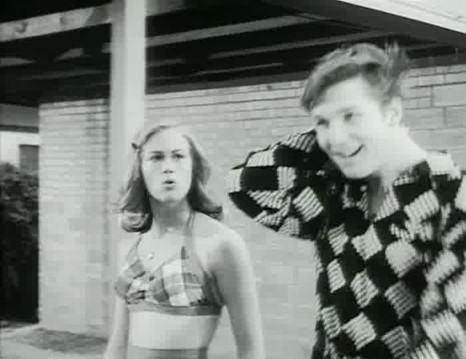Réalisation:
Peter BogdanovichPhotographie:
Robert SurteesActeurs·trices:
Timothy Bottoms, Jeff Bridges, Cybill Shepherd, Ben Johnson, Cloris Leachman, Ellen Burstyn, Eileen Brennan, Clu Gulager, Sam Bottoms, Randy Quaid (plus)Résumés(1)
Sonny et Duane, deux adolescents texans, passent leur temps entre le café et le cinéma, seules distractions possibles dans leur petite ville perdue aux confins du désert. Mais lorsqu'une fille provoque une dispute entre eux, Sonny décide de s'engager pour la Corée. Avant de partir, ils se rendent au cinéma une dernière fois... (Park Circus)
(plus)Critiques (5)
The Last Picture Show is a movie about the difficult period of adolescence, the creation of one's value system, the loss of innocence, the first sexual experiences (which may not be the same thing), the loss of illusions, and the transformations of a small Texas town during the economic and technological boom of the early 1950s. The post-war prosperity, further compounded by oil fever, along with the arrival of television as the main source of entertainment, led to greater individualization of society and a lifestyle change, symbolized by the decline of the local movie theater and entertainment club. In The Last Picture Show, the story is not important (on the contrary, it is deliberately suppressed), but rather more important is the overall atmosphere supported by maximum meticulousness, with which the filmmakers captured the smallest details, the consistency with which they dedicated themselves to the dialogue or the complexity of the natures of the individual characters. In the movie, not much actually happens, but you can feel the dramas that take place outside the camera's view and the conflicts that collide in the minds of the characters. I consider this film to be an exceptionally successful black-and-white retro with excellent performances and a sense of authenticity rarely seen in the film industry. In the case of such films, I am often irritated by lofty phrases, unhistorical thinking, artificial plot twists, or catering to the taste of the mass audience. Here, I simply have nothing to criticize. The character's actions are sometimes impulsive and often go against what I believe in, but they correspond to the complexity of the time and the characters, which were not crafted by a routine screenwriter. The character portrayed by Cybill Shepherd is worth mentioning, where the young actress demonstrated not only her charms but also refined character acting and managed to transform from a naive romantic girl into a dangerous and manipulative vixen. Overall impression: 95%.
()
Not a pleasant film, but definitely interesting and very authentic - every character is somehow a strange person. And not always sympathetic. The fates of all the characters, young and old, are compelling and unpredictable, some evolving (for better, for worse) and others actually going round and round, like local radio playing the same songs over and over again, only occasionally including a unique song. Peter Bogdanovich filmed it all so cleverly that one has the feeling that one is really watching a film from the fifties - a kind of sleepy film that moves slowly simply because it can.
()
My first encounter with Bogdanovich and I could write an entire essay about it. A massively overlooked gem that wonderfully and effectively brings to life a transitional period in American culture, with a format that places it the context of neo-Hollywood and European cinema modernity. At first glance, the film doesn’t have a motivationally tight story and doesn’t follow a single major goal, but playfully hovers among the characters, focusing on capturing moments, not in a careless or mundane fashion, but through the smallest symbolisms, to reflect about the social changes and the aforementioned transitional period. The anchor is the cinema and arcade in an otherwise boring remote town, run by the ageing Sam, who, in his cowboy outfit and through his life wisdom, represents for the young people (and himself) an echo of old-timey morality, not only in cinema. And indeed, his innocent undressing by a pool with a group of peers at the beginning seems like an embarrassing act, only to later, after the juvenile fascination has shifted from the film screenings to the opposite sex, ignite casual love and moral indifference, with the youngsters, who run away from their parents like in Rebel Without a Cause, as numb witnesses unable to emotionally react to the the murder of an innocent boy, and one of the main characters ending up leaving to fulfil his military duty, confirming the end of the idyllic era of heroes like John Wayne and the onset of the depression and the social crisis of the Vietnam years. The young people don’t know what to expect from life and The Last Picture Show reflects that in a timeless manner, because the future generations will also have to find themselves among the sexual motivations of their time, and also wholesome with regards to the historical cinema references and the perfect portrayal of 1950s America. Cybill Shepherd’s performance is wholesome, too, as the dream of every horny teenager in that sleepy Texan town (or actually, everywhere). 90%
()
Un vent de nostalgie triste et particulier. C’est comme une tranche de vie enregistrée sur une pellicule de polaroïds noir et blanc que le temps aurait emportée depuis longtemps et qui reposerait aujourd’hui sous la poussière avec ses souvenirs oubliés. Les joies et les peines d’individus qu’on aurait crues anodines. Pourtant, leur histoire vous prend à la gorge comme si elle se déroulait directement sous votre nez. Une expérience étonnamment vivante qui se renforce au plus on se repasse le film. Bogdanovich avait l’art de capturer l’essence d’un milieu et d’une époque.
()
Peter Bogdanovich demonstrates how strong he was in his ability to portray crucial moments in human lives, while presenting them with awkwardness and with the intention of making us reflect upon ourselves and realize that these are moments that we have experienced ourselves, with other people, but with a very similar mood that subsequently affected us. Excellently acted and directed.
()

